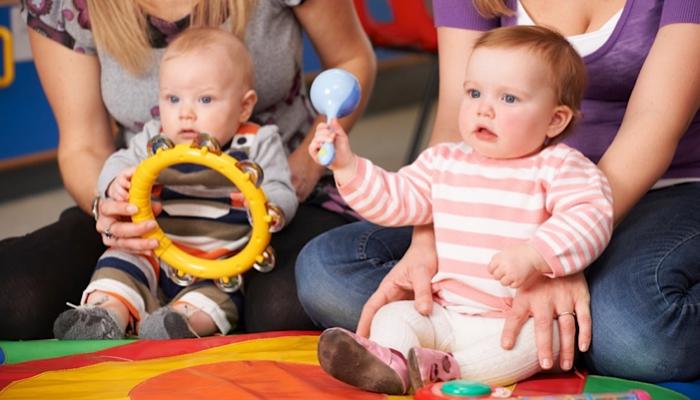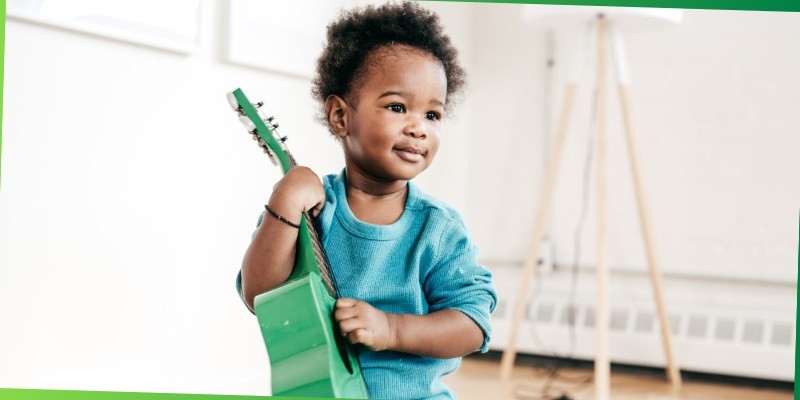Introducing music to babies and toddlers can greatly enrich their lives. Music can help with language development, emotional expression, and cognitive growth.
Music is a universal language that speaks to all ages. For babies and toddlers, it offers much more than just entertainment. It can shape their brain development, improve their motor skills, and provide a soothing environment. Starting early with music can foster a lifelong appreciation and love for it.
Whether it’s singing lullabies or playing gentle tunes, music can be a powerful tool in your child’s growth. This guide will show you simple and effective ways to introduce music to your little one. Let’s explore how you can make music a joyful part of their daily life.
Benefits Of Early Music Exposure
Introducing music to babies and toddlers boosts their brain development and enhances language skills. Singing lullabies or playing gentle tunes can create a soothing environment, fostering emotional bonds. Simple musical activities encourage creativity and sensory experiences.
Introducing your baby or toddler to music can be a joyful experience for both you and your child. Early music exposure isn’t just about having fun; it comes with a host of benefits that can positively impact your child’s growth. Let’s explore how music can enhance cognitive development and emotional well-being in young children.Cognitive Development
Music can stimulate your child’s brain in ways that few other activities can. Listening to and playing music helps improve memory, attention span, and problem-solving skills. Singing nursery rhymes, for example, can help your child learn new words and improve their language skills. Even simple activities like clapping along to a rhythm can boost motor skills. Have you ever noticed how your baby responds to a catchy tune? This is their brain working hard to process the different sounds and patterns. It’s fascinating to see how quickly they start to recognize and respond to familiar songs.Emotional Well-being
Music has a unique way of connecting with emotions. Playing soothing music can calm a fussy baby and help them feel secure. Upbeat tunes can lift their spirits and make them giggle. When you sing to your child, you’re not just entertaining them; you’re also creating a bond. This can make them feel loved and cherished. It’s a simple way to strengthen your emotional connection. Imagine the joy on your toddler’s face when they dance to their favorite song. This isn’t just fun; it’s a way for them to express themselves and release energy. Music can be a healthy outlet for emotions, helping your child navigate their feelings. Introducing music to your baby or toddler can be a wonderful journey. Have you tried singing a lullaby or playing a musical instrument for them? These small actions can make a big difference in their development and happiness. So go ahead, turn up the music, and enjoy the magical moments it brings!
Credit: thespoke.earlychildhoodaustralia.org.au
Choosing The Right Music
Introducing music to babies and toddlers aids in their cognitive development. Play gentle tunes to soothe them. Sing simple songs to engage their attention.
Introducing music to your baby or toddler can be a delightful experience. Music has the power to soothe, entertain, and even educate. But how do you choose the right music for your little one? Here’s a guide to help you make the best choices.Age-appropriate Tunes
Babies and toddlers have different musical needs. For newborns, gentle lullabies can be very calming. Soft classical music is a great choice too. As your child grows, you can introduce more upbeat tunes. Toddlers enjoy songs with simple, repetitive lyrics. Think “Twinkle, Twinkle, Little Star” or “Old MacDonald Had a Farm.” Pay attention to your child’s reactions. If they smile or move to the rhythm, you’re on the right track.Variety In Genres
Don’t stick to just one type of music. Expose your child to a variety of genres. This can help in developing their musical taste and appreciation. Classical music can improve focus and calmness. Jazz tunes can introduce complex rhythms. Even a bit of pop music can be fun for a dance session. Introduce world music for a cultural twist. African drums or Indian sitar can be fascinating for young ears. Remember to keep the volume at a comfortable level. Too loud can be overwhelming for tiny ears. What kind of music does your baby respond to the most? Experiment and find out.Interactive Music Activities
Interactive music activities are a great way to introduce music to babies and toddlers. They help in developing motor skills, language, and emotional bonding. These activities can turn any moment into a fun learning experience. Let’s explore some engaging ways to include music in your child’s daily routine.
Singing And Dancing
Singing to your baby can be soothing and educational. Simple nursery rhymes and lullabies are a good start. Repeat the same songs to help them recognize words and melodies. Dancing with your toddler can be a fun workout. Play different types of music and encourage them to move. They can clap their hands, stomp their feet, or sway to the beat. This activity improves coordination and rhythm.
Musical Instruments
Introduce your child to musical instruments. Start with simple ones like a tambourine, maracas, or a xylophone. Let them explore the sounds each instrument makes. This will pique their curiosity and improve their fine motor skills. You can also use household items as instruments. Pots, pans, and wooden spoons make great drums. Encourage your child to create their own music. This boosts creativity and confidence.

Credit: www.wonderbaby.org

Credit: www.amazon.com
Frequently Asked Questions
How To Introduce Music To Infants?
Play soft, soothing music during nap times. Sing lullabies to your baby. Introduce musical toys. Enjoy baby-friendly music together.
What Age Should Babies Start Listening To Music?
Babies can start listening to music from birth. It helps with brain development and soothes them. Music can also enhance bonding and language skills. Choose gentle and soft tunes for the best effect.
What Is The Best Type Of Music To Listen To With Infants And Toddlers?
Classical music, lullabies, and gentle nature sounds are best for infants and toddlers. They promote relaxation and cognitive development.
When To Start Teaching Music To Toddlers?
Start teaching music to toddlers around age 2 or 3. Simple songs and rhythm activities work best.
Conclusion
Introducing music to babies and toddlers creates joy and learning. Music helps in their development. It builds language skills and emotional connection. Keep sessions short and fun. Use songs, instruments, and dances. Make it a daily habit. Encourage their involvement and watch them thrive.
Music can become a cherished part of their life. Enjoy these moments together.

